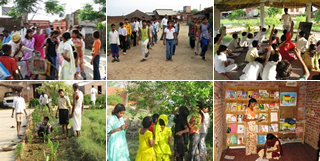Vikas Trust
Striving to Ensure Social Justice
The State of Child Labour in Glass and Bangle Industry
Glass and bangle industry of Firozabad provides employment to more than 500,000 men, women and children. A large number of children are engaged in bangle, glass (and carpet industry and agriculture sector) in Firozabad (and Agra) districts of Uttar Pradesh. They face multiple ranges of vulnerability and exploitation.
Secondary information reveals that 16 out of every 100 children worldwide are engaged in exploitative child labour – in violation of convention on the rights of the child and international labour standards. Almost three-fourth of them works in hazardous environments, such as mines or factories, or with dangerous substances, such as chemicals.
In this context child labour remains a serious problem both in Firozabad and Agra districts even though the government has established several legal instruments to address the problem of child labour. Children are working in highly polluted, dangerous, and unhealthy working environment, which in many instances is the primary source of a variety of serious health problems.
The child labourers face a number of problems which compel them to be in the same situation and they never come out of their situations. The following are some of the reasons:
- Children work because their families are poor and their labour is necessary for survival of their families.
- In comparison to an adult, children are often employed and exploited as they are more vulnerable, cheaper to hire and are less likely to demand higher wages and better working conditions.
- Child labour perpetuates poverty – working children do not have the opportunity to go to school and grow up to be unskilled adults trapped in poorly paid jobs and in turn look to their own children to supplement the family's income.
These reasons further lead to vulnerability of the poor and marginalised community groups. During its interventions, the organisation has critically assessed the ground situations of the families, who are engaged in bangle making, glasswork, carpet weaving work and agriculture work. It has also assessed the reasons of the involvement of their children into work, which are:
- Families are facing chronic hunger situations.
- Food enforcement and education entitlements are not accessible to child labour families.
- Services like education, health, water and sanitation do not reach the eligible and needy families in the villages.
- Drop-out rate, especially of girls is very high.
- Infrastructure and facilities run and supported by government are not properly placed and they do not address the concerns of child labour families.
- Families are living as migrant, which does not allow them to get the benefit of government services/social security schemes, as they do not have identity card or any other supporting documents for getting entitlement. They even do not enjoy the benefit of public distribution system (PDS), scholarship to their children and other entitlements.
These poverty and deprivation situations compel the children especially the child labourers to lead a pathetic life full of exploitation at every sphere of life.
